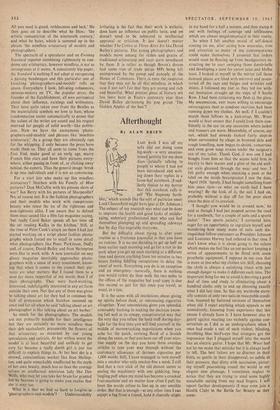Afterthought
By ALAN BRIEN
But the difficulty about tying to alter your routine as a freelance journalist is that you have no routine. It is no use deciding to get up half an hour earlier each morning and go for a trot in the park when you get up each morning at a different time and devote anything from ten minutes to two hours finding fiddling occupations to delay the onset of work. Everything you do is an exception and an emergency—naturally, there is nothing you would rather do than walk the two miles to the offices of the magazine but yout copy is due this second so just for this once you travel, as usual, in a taxi.
It is the same with all resolutions about giving up spirits before dusk, or renouncing cigarettes altogether. Your unconscious gives you splendid, comradely backing in making the decision know- ing full well in its creepy, conspiratorial way that the very day you refuse the hard stuff during day- light for the first time you will find yourself in the middle of nervewracking negotiations when you ache for the quick, reviving flood of a Scotch along the veins, or that you have cut off your nico- tine supply on the day you have three overdue articles to type your way through without the customary allowance of thirteen cigarettes per 1,000 words. Still, I have managed to turn myself into a smoker who only smokes five a week. I still find that a rare stick of the old demon seems to unclog the machinery with one giddying, lung- tingling puff when my mind has become a crooked fruit-machine and no matter how often I pull the lever the words refuse to line up in any sensible order. But that is enough—at any other time I can accept a fag from a friend, hold it clumsily alight in my hand for a half a minute, and then stamp it out with feelings of courage and selflessness which are almost megalomaniacal in their vanity.
So when I felt another mood of self-denial coming on me, after seeing how muscular, trim and attractive so many of my contemporaries could make themselves. I assumed that orders would soon be floating up from headquarters in-
structing me to start swinging those dumb-bells and developing a taste for carrot juice and Melba toast. I looked at myself in the mirror (all those damned places are lined with mirrors) and inven- toried all the sags and bulges and wrinkles and shines. I followed my feet as they led me with- out hesitation straight, up the steps of 9 Savile Row. I had been criticising my flesh in the glass. My unconscious, ever more willing to encourage extravagance than to condone exercise, had been running down my clothes. Ah well, if I couldn't match those fellows in a jock-strap, Mr. Woor would at least ensure that I could look them con- fidently in the eye on any occasions where jacket and trousers are worn. Meanwhile, of course, my suit, which had already looked fairly slept-in when surrounded by chaps in bronzed skin and rough towelling, now began to-shrink, concertina and even grow soup strains under the surgeon's eye of my tailor. Thank God, it was one I had bought from him so that the seams held firm in loyalty to their master and a glint of the old well- cut style gleamed through the wear and tear. I felt guilty enough when sneaking a peek at the label on the inside breastpocket I saw the date, 'April 1958.' Surely, I had bought something from him since then—or what on earth had I been wearing? By the look of it, the suit I had on, probably without a day off for the poor slave since the date of its creation.
'I thought you would be in around now,' he said as though I had just popped across the road for a sandwich, 'for a couple of suits and a sports jacket.' Two sports jackets,' 1 corrected him, eager for an opportunity to ingratiate myself and wondering how many score of suits such dis- tinguished fellow-customers as President Johnson and Laurence Harvey had ordered in that time. I don't know what it is about going to the tailors which makes me feel like an out-patient keeping a series of appointments to be fitted with some prosthetic equipment. I suppose in my case that is more or less what my clothes are. Still, choosing the cloth is always a satisfying ritual with just enough danger to make it different each time. The important thing for me to avoid is devoting a good deal of time and study to eliminating about a hundred cloths only to end up choosing exactly what I did last time. So that my wardrobe etern- ally consists of only two suits in reasonable condi- tion, haunted by battered versions of themselves when old. I reject anything which appeals to me immediately, knowing from experience that this
means I already have it. I have however also to guard against reacting too violently against con- servatism as I did as an undergraduate when I once had made a suit of such violent, blinding, throbbing blue bird's-eye that Strangers got the impression that I plugged myself into the mains
like an electric guitar. I hope that Mr. Woor had not let me make that mistake but it is always hard
to tell. The best tailors are so discreet in their hints, so gentle in their disapproval, so subtle in their pressure, that dizzy with narcissism, pictur- ing myself peacocking round the world in my elegant new plumage, I sometimes neglect to notice that they are trying to steal some highly
unsuitable suiting from my mad fingers. I will report further developments (I may even join a Health Club) in the Battle for Beauty as they occur.


































 Previous page
Previous page